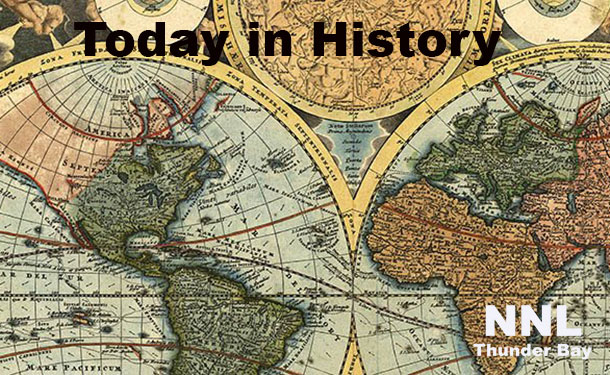THUNDER BAY – HISTORY – The Day the Music Died. On this day in history, February 3 1959, Rock and Roll musicians Buddy Holly, Ritchie Valens, and J. P. “The Big Bopper” Richardson died following a plane crash near Clear Lake, Iowa.
Following a performance on the tour at the Surf Ballroom in Clear Lake, Iowa on February 2, 1959, Holly chartered a small airplane to take him and two others from nearby Mason City to Moorhead, Minnesota, the next stop on the tour. The charter’s pilot, Roger Peterson, took off in inclement weather, even though he was not certified to fly by instruments-only. Following takeoff in the early morning hours of February 3, Holly, along with Ritchie Valens, J. P. Richardson, and the pilot, were all killed when the plane crashed shortly after takeoff. Rock performer, archivist and music historian, Harry Hepcat, wrote in his article about Buddy Holly, “Although the plane came down only five miles northwest of the airport, no one saw or heard the crash. The bodies lay in the blowing snow through the night…February indeed made us shiver, but it was more than the cold of February that third day of the month in 1959. It was the shiver of a greater, sometimes senseless, reality invading our sheltered, partying, teenaged life of the 50’s.”
- 1112 – Ramon Berenguer III of Barcelona and Douce I of Provence marry, uniting the fortunes of those two states.
- 1377 – More than 2,000 people of the Italian city of Cesena are slaughtered by Papal Troops (Cesena Bloodbath).
- 1451 – Sultan Mehmed II inherits the throne of the Ottoman Empire.
- 1488 – Bartolomeu Dias of Portugal lands in Mossel Bay after rounding the Cape of Good Hope, becoming the first known European to travel so far south.
- 1509 – The Portuguese navy defeats a joint fleet of the Ottoman Empire, the Republic of Venice, the Sultan of Gujarat, the Mamlûk Burji Sultanate of Egypt, the Zamorin of Calicut, and the Republic of Ragusa at the Battle of Diu in Diu, India.
- 1534 – Irish rebel Silken Thomas is executed by the order of Henry VIII in London, England.
- 1637 – Tulip mania collapses in the United Provinces (now the Netherlands) as sellers could no longer find buyers for their bulb contracts.
- 1690 – The colony of Massachusetts issues the first paper money in the Americas.
- 1706 – During the Battle of Fraustadt Swedish forces defeat a superior Saxon-Polish-Russian force by deploying a double envelopment.
- 1781 – American Revolutionary War: British forces seize the Dutch-owned Caribbean island Sint Eustatius.
- 1783 – American Revolutionary War: Spain recognizes United States independence.
- 1787 – Militia led by General Benjamin Lincoln crush the remnants of Shays’ Rebellion in Petersham, Massachusetts.
- 1807 – A British military force, under Brigadier-General Sir Samuel Auchmuty captures the Spanish Empire city of Montevideo, now the capital of Uruguay.
- 1809 – The Territory of Illinois is created by the 10th United States Congress.
- 1813 – José de San Martín defeats a Spanish royalist army at the Battle of San Lorenzo, part of the Argentine War of Independence.
- 1825 – Vendsyssel-Thy, once part of the Jutland peninsula that formed westernmost Denmark, becomes an island after a flood drowns its 1 km wide isthmus.
- 1830 – The sovereignty of Greece is confirmed in a London Protocol.
- 1834 – Wake Forest University is established.
- 1852 – Justo José de Urquiza defeats Juan Manuel de Rosas at the Battle of Caseros.
- 1870 – The Fifteenth Amendment to the United States Constitution is ratified, guaranteeing voting rights to citizens regardless of race.
- 1897 – The Greco-Turkish War breaks out.
- 1900 – Governor of Kentucky William Goebel dies of wound sustained in an assassination attempt three days earlier in Frankfort, Kentucky.
- 1913 – The Sixteenth Amendment to the United States Constitution is ratified, authorizing the Federal government to impose and collect an income tax.
- 1916 – Parliament buildings in Ottawa, Canada burn down.
- 1917 – World War I: The United States breaks off diplomatic relations with Germany a day after the latter announced a new policy of unrestricted submarine warfare.
- 1918 – The Twin Peaks Tunnel in San Francisco, California begins service as the longest streetcar tunnel in the world at 11,920 feet (3,633 meters) long.
- 1931 – The Hawke’s Bay earthquake, New Zealand’s worst natural disaster, kills 258.
- 1943 – The USAT Dorchester is sunk by a German U-boat. Only 230 of 902 men aboard survived. The Chapel of the Four Chaplains, dedicated by President Harry Truman, is one of many memorials established to commemorate the Four Chaplains story.
- 1944 – World War II: During the Gilbert and Marshall Islands campaign, U.S. Army and Marine forces seize Kwajalein Atoll from the defending Japanese garrison.
- 1945 – World War II: As part of Operation Thunderclap, 1,000 B-17s of the Eighth Air Force bomb Berlin, a raid which kills between 2,500 to 3,000 and dehouses another 120,000.
- 1945 – World War II: The United States and the Philippine Commonwealth begin a month-long battle to retake Manila from Japan.
- 1947 – The lowest temperature in North America is recorded in Snag, Yukon.
- 1957 – Senegalese political party Democratic Rally merges into the Senegalese Party of Socialist Action (PSAS).
- 1958 – Founding of the Benelux Economic Union, creating a testing ground for a later European Economic Community.
- 1959 – Deaths of rock and roll musicians Buddy Holly, Ritchie Valens, and J. P. “The Big Bopper” Richardson, in a plane crash near Clear Lake, Iowa.
- 1960 – British Prime Minister Harold Macmillan speaks of “a wind of change”, an increasing national consciousness blowing through colonial Africa, signalling that his Government is likely to support decolonisation.
- 1961 – The United States Air Forces begins Operation Looking Glass, and over the next 30 years, a “Doomsday Plane” is always in the air, with the capability of taking direct control of the United States’ bombers and missiles in the event of the destruction of the SAC’s command post.
- 1961 – A protest by agricultural workers in Baixa de Cassanje, Portuguese Angola, turns into a revolt, opening the Angolan War of Independence, the first of the Portuguese Colonial Wars.
- 1966 – The unmanned Soviet Luna 9 spacecraft makes the first controlled rocket-assisted landing on the Moon.
- 1967 – Ronald Ryan, the last person to be executed in Australia, is hanged in Pentridge Prison, Melbourne.
- 1969 – In Cairo, Yasser Arafat is appointed Palestine Liberation Organization leader at the Palestinian National Congress.
- 1971 – New York Police Officer Frank Serpico is shot during a drug bust in Brooklyn and survives to later testify against police corruption. Many believe the incident proves that NYPD officers tried to kill him.
- 1972 – The first day of the seven-day 1972 Iran blizzard, which would kill at least 4,000 people, making it the deadliest snowstorm in history.
- 1984 – John Buster and the research team at Harbor-UCLA Medical Center announce history’s first embryo transfer, from one woman to another resulting in a live birth.
- 1984 – Space Shuttle program: STS-41-B is launched using Space Shuttle Challenger.
- 1989 – After a stroke two weeks previously, South African President P. W. Botha resigns as leader of the National Party, but stays on as president for six more months.
- 1989 – A military coup overthrows Alfredo Stroessner, dictator of Paraguay since 1954.
- 1995 – Astronaut Eileen Collins becomes the first woman to pilot the Space Shuttle as mission STS-63 gets underway from Kennedy Space Center in Florida.
- 1998 – Karla Faye Tucker is executed in Texas, becoming the first woman executed in the United States since 1984.
- 1998 – Cavalese cable car disaster: a United States Military pilot causes the death of 20 people when his low-flying plane cuts the cable of a cable-car near Trento, Italy.
- 2007 – A Baghdad market bombing kills at least 135 people and injures a further 339.
Sources: Wikipedia




